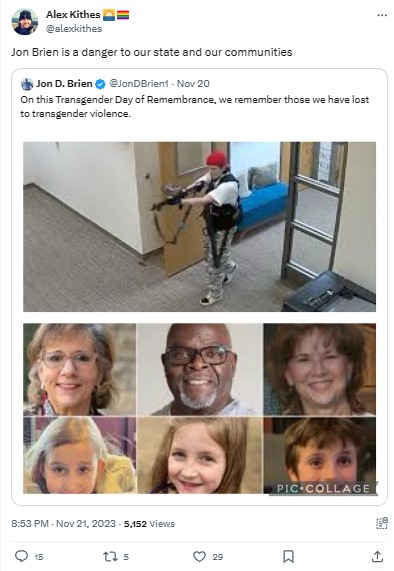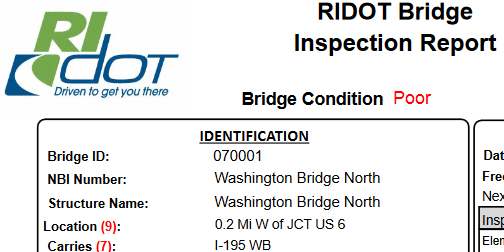On WNRI 1380 AM/95.1 FM, John DePetro and Justin Katz discuss:
- The Heritage Hall of Fame finds its bridge too far.
- The state of Rhode Island’s bridges shows neglect.
- Ferry service shows McKee’s lack of consideration.
- The push for a new courthouse represents the Providence Plantation.
- Minimum wage increases harm Rhode Islanders.
Featured image by Justin Katz using Dall-E 3 and Photoshop
[Open full post]As we watch progressive activists disrupt life in America, apparently with impunity, progressive attorneys general are happy to provide contrary examples dependent upon political viewpoint:
Massachusetts Attorney General Andrea Joy Campbell is suing an increasingly active neo-Nazi group and two of its leaders for an escalating pattern of harassing, intimidating, and confrontational conduct at anti-immigration protests and demonstrations against drag queen story-hours around the state.
The Nationalist Social Club, or NSC-131, and its leaders, Christopher Hood, of Newburyport, and Liam McNeil, of Waltham, repeatedly have showed up at public libraries hosting the story hours and hotels providing emergency shelter to new immigrants …
The group is distasteful, to be sure, but their rights are our rights. As we saw with the Harvard and MIT presidents, we’re not merely looking at a situation in which the law is a somewhat shifting the line between speech and action (harassment). The proposition is that the very same action would be speech by a politically favored group and harassment by a disfavored group. The ruling Party protects its own and persecutes those with whom it disagrees. This is not freedom. It’s not democracy. It’s not equality. It’s tyranny, and if we accept it to dispatch with people we don’t like, we’ll soon find ourselves disliked by the authorities and with nobody to stand up for us.
[Open full post]It may be tempting, if you come across images of protest actions around the country during the Christmas holiday ,to believe the protesters are generally being honest about their motivation. In their minds, a horrific event is happening in Gaza, and they feel compelled to act in opposition in whatever way they can. Personally, I don’t believe them.
Horrific events happen all the time in the world without this sort of reaction, and in any event, the means of disruption — blocking highways to airports, attacking police officers, and protesting community Christmas events — are tuned to disrupt, but not to inspire sympathy and agreement. Moreover, the movement is the same as that to which Democrat State Representative Enrique Sanchez played on Thanksgiving: “I don’t celebrate holidays that are the result of genocide of our indigenous people.”
To progressives, our whole way of life is a genocidal affront. Disrupting our lives and undermining our civilization is the point, and while it’s easy to confuse passion with righteousness, a better world isn’t on the other side of capitulation to their demands. We’re diving into an era of reverse racism and permissible oppression, and it won’t correct anything, only damage more lives.
[Open full post]On WNRI 1380 AM/95.1 FM, John DePetro and Justin Katz discuss:
- McKee seizes the moment to define himself
- Where are all the RI pols?
- This is who runs the state?
- A ferry to nowhere
- Bought in legislative pensioners
Featured image by Justin Katz using Dall-E 3.
[Open full post]Hardly a day goes by that doesn’t increase the skepticism I bring to recent Ivy League degrees. Do students at these schools have any appreciation of the practical world? If they have specific technical knowledge, to what extent is it buried beneath layers of cultish left-wing ideology?
If you, like me, have a strong feeling that America’s institutions of so-called higher education have opened a gateway to a separate reality, look no further than Brown University’s recent statement addressing recent campus protests:
Brown’s administration was widely criticized for having student protesters arrested. Not only were students opposed to the school’s response, but more than 200 faculty called on the school to drop the charges. When they were dropped, Brown released a lengthy, complex statement reflecting on Awartani’s injuries, a history of campus activism and the student body’s current divisions.
“We have rarely seen a moment like this across this country that pits members of campus communities against each other,” the school said. “These are extraordinary times, and we recognize that.”
Despite having directed the arrests to be made, Brown recognizes uprisings of the past, its library documenting them in detail. The university calls it “part of the multi-dimensional fabric” on campus, and says protests “exemplify the humanitarian spirit at the core of the Brown community.”
For those you’ve thought of colleges and universities as part of our shared society, a statement like “we have rarely seen a moment like this across this country that pits members of campus communities against each other” may be puzzling. What do they mean by that?
On the other hand, the statement is perfectly clear — a commonplace — if you recognize that the people who inhabit these institutions think of themselves as more enlightened than, distinct from, and above the common people. For decades, Brown University and its students have been “pitted against” other people. You. The policies and traditions you support. Students are supposed to be protesting against and hating you. You can call it “white supremacy,” “patriarchy,” “cis heteronormativity,” or whatever; those are all just meaningless synonyms for people who aren’t as morally deserving as those who pass through Brown University.
The challenge is that Hamas’s savage, Medieval brutality on October 7 and the shocking (surprisingly well-organized and well-funded) support of it across the West has put America’s self-presumed elites in an awkward position. The progressive identity group that has provided the symbolism for this year’s “no justice no peace” protests is in direct conflict with one of the original victim groups of actual white supremacy: Jews.
Let’s notice something in tangent, here, that goes directly to Brown’s problem: The defensive claim that it’s possible to oppose Israel while not opposing Jews is hollow, these days, in large part because the ideology of group identity prevents it. While not all citizens of Israel are Jews, the Jewish identity is intrinsic to the state. Traced back to scriptures thousands of years old, Israel is the land of Jews.
So, when a survey asks respondents whether “Jews as a class are oppressors and should be treated as oppressors,” a generation of young adults now 18-24 years old who have been educated entirely under the dark cloud of identity politics says, “yes,” 67% of the time. It doesn’t resolve this problem that the other survey answers are confused, with 69% of these young respondents also believing Israel has “a right to exist as the homeland of the Jewish people.” To be frank, it isn’t clear that they have any understanding of actual reality. Fifty-eight percent of them believe “Hamas would like to commit genocide against the Jews,” but 60% believe “Israel is committing genocide against those in Gaza.” Despite it all, 76% think “Hamas is an organization that can be negotiated with to create peace.”
Two explanations exist for these results, and they can coincide. First, these kids have simply learned that the word “genocide” is anodyne activist-speak for “opposing.” Second, they think every identity group intrinsically wants to wipe out every other identity group, but that some can be labeled as “oppressor,” which makes them the default bad guys. An earlier question in the report finds 79% of these 18-24 year olds supporting an ideology that says “white people are oppressors and nonwhite people and people of certain groups have been oppressed and as a result should be favored today at universities and for employment.” They believe this despite the fact that only a narrow majority (51%) think the attitude is helpful to society.
In a delusional world in which every group wants to commit genocide against every other group, American campuses that once deserved the label of “elite” serve up “oppressors” as the Other against whom their communities should unite. Beyond being probably unemployable, their graduates should arguably be considered dangerous.
Featured image by Jose Clement-Orozco, “The Clowns of War Arguing in Hell,” from WikiArt.
[Open full post]You may remember that truck-only tolls were passed with dire statements about the condition of Rhode Island bridges. “People will die if we don’t get this new revenue stream to repair Rhode Island’s poor bridges” was repeatedly stated or heavily implied during the debate about and passage of the proposed new, legally quizzical, unnecessary toll on large trucks requested by former Governor Gina Raimondo and current RIDOT Director Peter Alviti.
Wow, sounds serious. Okay, Gov Raimondo and RIDOT, here’s your dubious new revenue stream.
But if the bridges are that bad and their condition poses such a dire threat to public safety, you’re at least going to repair them from worst to first, right, RIDOT?
Sure, they can’t be repaired exactly worst to first for reasons of logistics. So you triage. And the repair of a bridge whose condition was rated as “Poor” by RIDOT at least as far back as July, 2020; over a body of water (which would exacerbate corrosion); and that contains critical structural components from 1968 should be high on the list, not get postponed with crossed fingers.
Minimally, that bridge gets prioritized ahead of a bridge with a sufficiency rating of 72% per RIDOT’s own inspection report – the Oxford Street Bridge – that happens (undoubtedly a total coincidence) to be in a strategically advantageous location to maximize your legally dubious new revenue stream.
But that’s not what happened. Repairs, necessary or not, to the Oxford Street Bridge were completed in December, 2019. Much needed repairs to the Washington Bridge had not yet commenced when it was suddenly closed Monday due to the imminent failure of a critical component.
Members of the public, who pay for all of this and some of whose lives and businesses are being seriously disrupted, are being scolded for asking questions rather than simply being grateful that a catastrophic collapse was avoided and people did not die.
But isn’t that kind of a baseline? Isn’t it reasonable to expect that, minimally, state government will deliver the public services and projects we fund with an absence of fatalities?
In fact, the public has the right to expect a little more; to expect, for example, that the state highway infrastructure for which we pay top dollar is functional.
In the aftermath of the abrupt closure of the westbound side of the Washington Bridge, the Director of RIDOT has widely stated in the media
What you’re seeing here is the system working
Umm, your “system” resulted in the necessity to close one side of an interstate. The daily flow of 96,000 vehicles was abruptly stopped. The resulting massive diversion of those vehicles has seriously disrupted lives, businesses, commerce and medical care. That’s not a system “working”.
As experts have commented, “It shouldn’t have come to this”. Those anchor pins needed attention far sooner than RIDOT had scheduled.
The closure of the Washington Bridge clearly calls for a change of direction and for RIDOT to adjust their “system”. Here’s one idea. How about we prioritize the repair of bridges in worse condition over those in better condition? Otherwise, as we were urgently told in 2016, people might die.
[Featured image credit: Snapshot from RIDOT’s July, 2020 inspection report of the Washington Bridge classifying its condition as “Poor”.]
[Open full post]Nobody on your political bench can do much better than what you’re seeing now. Democracy has produced the government you actually wanted for so long that the bill is coming due. I wrote about the “Four Horsemen of Rhode Island’s Apocalypse” 15 years ago, and the situation’s only gotten worse as people not in the following four groups have left to find hope and opportunity outside of their reach:
1. Powerful insiders. These are the folks who benefit most directly from Rhode Island’s system and represent what might be termed the power base: legislators, judges (and magistrates), union executives, activist leaders (such as the crew at the Poverty Institute who get their say in just about every Journal article), and other heads of “important” institutions in the state.
2. Budget-bought political commodities. 630AM talkers Dan Yorke and Matt Allen often point to what they term the “rub ’n’ tug” system, whereby the legislature hands out non-itemized grants to community groups as offerings of endearment, but from a certain perspective, rubbing ’n’ tugging is the core function of the state government. Unions and the social-service industry can turn out people to vote and to demonstrate (often while everybody else is at work) in an industrial rub ’n’ tug with the powerful insiders.
3. The unaffected rich. Think Sheldon Whitehouse. Small in numbers, perhaps, but huge in wealth, a significant number of people in Rhode Island (which my father, in New Jersey, calls “a playground for the rich”) are free to experiment and pay ideological homage to their vanity, because no conceivable policy could have so detrimental an effect as to do more than create the possibility that some future generation will have to sell the Newport summer manse.
4. Affianced ideologues. With some substitutions of kind, but not of essence, the above groups could stoke corruption across the political spectrum. However, in Rhode Island those who give the state its blue hue are wedded to the Democrats, as are the many, generally apathetic, citizens who have somehow imbibed the notion that a vote for the Democrats is, simply by their role in the natural order of the universe, a vote for the good guys.
For decades voters in those four groups have wanted the sort of government we have, so nobody within striking range of important elective office has any idea how to govern in ways that don’t satisfy them. And satisfying them has nothing to do with ensuring sudden bridge failures don’t disrupt the lives of everybody in the region or that major employers don’t pack up and leave.
Think about it. The special interests who run the state benefit from the deterioration of our infrastructure, economy, and society. The failure of a crucial piece of infrastructure means more excuses for federal money and more people willing to pay taxes and fees just to fix the problem. The loss of major private-sector employers means, first, more people in need of government services, and second, fewer powerful institutions that might have conflicting interests to those of the insiders. Failing schools mean the possibility of more pressure for funding and government programs, not to mention a more-pliable public (while the insiders can send their children, if they have any, to private schools).
All of these incentives mean politicians currently on the radar for higher office are necessarily bought and sold, and the reality of mail ballots means nobody will be able to swoop in from off the radar. Those who’ve been hitching a ride on the four ponies will have to jump off and do something unpredictable, like think for themselves and expand their perspectives beyond narrow, immediate interests.
Featured image by Justin Katz using Dall-E 3 and Photoshop AI.
[Open full post]We humans have a natural impulse to fight fire with fire. When it comes to politics, we have a tendency to think the move that has worked against us will work in reciprocation, but it isn’t always so. Often, in the long run, a maneuver or tactic that advances the opposition’s cause does so whoever wields it, because it is fundamentally the opposition’s tool. Evil always serves the cause of evil, even (or especially) when the good think they can benefit from it. Water is the antidote to fire, not more fire.
It’ll take me a moment to explain why, but this is where my mind goes when I see commentary from progressives like this:

Putting aside interpersonal histories and visceral reactions to emotional issues, a curious thing is going on here that merits some thought.
Progressives want to celebrate transgenders. Conservative legislator Jon Brien is here highlighting an anti-Christian school massacre executed by a mentally ill girl who thought she was trans. In response, progressive activist Alex Kithes insists that Brien is the danger, and we have no reason to doubt that this is Kithes’s sincere reaction. Similarly, progressives want to celebrate Palestinians (and Muslims, generally). When people have highlighted the anti-Semitic massacre in Israel on October 7, Democrat politicians — and especially progressives — have proclaimed the danger of backlash against Muslims.
In both cases, an interesting question arises: Is this a deliberate strategy of narrative distortion, or is it a natural reaction based on core political sympathies? Or is it both, maybe for different people? In the case of narrative distortion, one cannot respond in kind with contrary distortions because it pushes the truth even farther out of sight. And in the case of political sympathy, one cannot respond with hostility, because it reinforces the core political allegiance.
Broadly speaking, for harmony in the human community, the antidote must be truth offered with expanded sympathy. We must be less concerned about the political significance of narrow groups because when we find the higher-level group of which we’re all a part, we respond to each other as individuals. And when that is our perspective, we can identify root causes. We don’t stop our analysis by concluding a person did something because he is part of Group Y, and that’s what Group Yers do. Rather, we ask what it is about Group Y that leads to such actions, and we realize that we might do it, too — maybe even that there’s something justified about it, whether or not we think it is being done well.
Here we see the essential problem of Leftist thought, which insists that everything must be political and that people must be divided into groups for the sake of a comprehensible narrative. We also should see that the solution to the Leftist problem is not to ensure that our group is the stronger one in an exchange of punches, because that cedes ground that we very much need to hold for the long run.
It’s like a boa constrictor. Pushing in one direction might gain the victim a small bit of motion in a particular direction, but the snake makes gains everywhere that the victim relaxed for the sake of the push.
For a full illustration of the point consider Rhode Island progressives’ promotion of the latest white supremacy sticker sighting, this time in Cranston:
- Left-wing state senate candidate Arthur Flanders posts pictures of two white-supremacy stickers that he claims to have come across on a Cranston bike path (before and after he attempted to destroy them).
- Turning Point RI jumped in to suggest (via quotation) that the sentiment of one of the stickers was unobjectionable: “It’s OK to be white.”
- Progressive podcaster Bill Bartholomew took the opportunity to prove his moral superiority by “flagging” the post while insisting that he has “basically ignored the juvenile RI Turning Point crew” (leaving unstated that he basically ignores all conservatives, whatever their maturity).
- Progressive UConn journalism professor Mike Stanton expressed his ideological allegiance with Bartholomew and followed up with this explainer from the Anti-Defamation League:
The phrase “It’s Okay To Be White” is a slogan popularized in late 2017 as a trolling campaign by members of the controversial discussion forum 4chan. The original idea behind the campaign was to choose an ostensibly innocuous and inoffensive slogan, put that slogan on fliers bereft of any other words or imagery, then place the fliers in public locations. Originators assumed that “liberals” would react negatively to such fliers and condemn them or take them down, thus “proving” that liberals did not even think it was “okay” to be white.
That’s quite an insight, and it has the air of a confession. Just so are all the days of remembrances, the series of This-That-Or-The-Other-Group Months, and the assorted identity weeks that seem to mark a perpetual time of commemoration of progressives’ favored groups. Promotion of this calendar is an obvious provocation seeking any objection activists can flag as evidence of “white supremacy” and the full platoon of haters. We’re all supposed to be celebrating Group Y this day/week/month; if you refuse to do so, it must be because you’re a bigot. In the case with which I began this post, Kithes simply thought Brien took the bait (although I’d suggest Brien outsmarted him).
The only way to win this game is not to play. As the saying goes, you shouldn’t wrestle with a pig, because you’ll only get covered in mud, and the pig likes it. Such are progressives. They obviously want hatred, fighting, division, untruth. They thrive in that environment. Don’t let them have it.
Featured image by Justin Katz using Dall-E 3 and Photoshop AI.
[Open full post]Progressive state representative Enrique Sanchez is entirely wrong, here:

Housing is a store of value. People will put up their own money for their own homes and for investment properties. If they’re not doing so — especially as the demonstrable value climbs and climbs — then government is doing something wrong to prevent it. This is absolutely clear and rudimentary analysis.
[Open full post]








